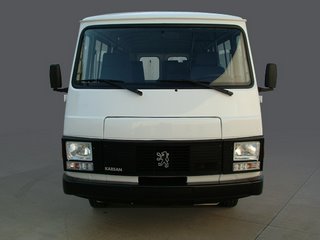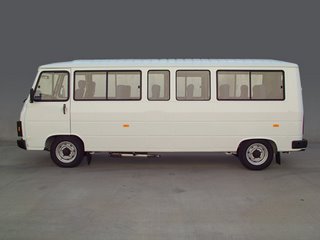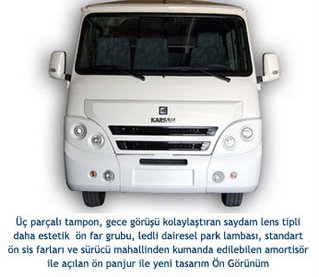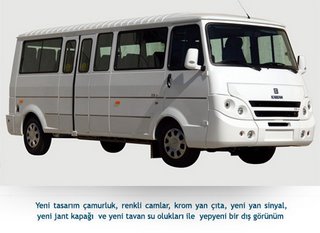





1966
• Karsan was formed in 1966 under the name "Bursa Otomontaj ve Karoseri AŞ" with 269 investors.
1979
• In 1979 the Koç Group assumed management control by raising its shares and renamed the company as "Karsan Otomotiv Sanayii ve Ticaret AŞ".
1981
• With completely domestic capital and the Peugeot license, Karsan began producing Peugeot J9 minibuses (only one year after Peugeot ) enabling them to take a place in the light commercial vehicle market by 1981.
1997
• Karsan achieved another first in the LCV sector in 1997 with the production of Turkey's first and only domestically produced minivan, Peugeot Partner. Karsan is the first producer of the Peugeot Partner outside of the parent company Peugeot.
1998
• In 1998 Karsan was Turkey's number one exporter of LCV's with exports totaling 44 million USD.• İnan Kıraç retired from the Koç Group in March 1998. He saw an opportunity in Karsan to bring his experience and love of the automotive industry together with his interest in the automotive models of the European markets and he went into action in bringing these models to life in Turkey with Karsan.• While the other automotive factories in the Koç Group were being equipped with cutting edge technology, Karsan had been slighted. Other automotive partners of Koç were also pushing to have Koç get out of its smaller businesses. In light of these developments and with the blessing of the Koç family and the other shareholders, İnan Kıraç bought out a majority of the shares in Karsan.• Under the firm belief that industry goes hand in hand with its suppliers, İnan Kıraç and the Kıraça Group's mission is to assist these suppliers and properly distribute spare parts in order to serve the Turkish automotive industry• Karsan exported 3,591 J9s in 1998 for a total of 44 million USD.
1999
• As a part of the Kıraça Group mission , Karsan completed its investment to meet increasing demand and upgrade production technology and raised the capacity of the factory from 10,000 to 25,000 vehicles. This investment took one year and was done mostly from equity share capital.• The new factory in the heart of the Turkish automotive sector in Bursa Akçalar Industrial Park with 60,000 m2 of closed area on a total of 220,000 m2 of land was completed by spending 62 million USD of the 70 million USD budget.• Owing to the fact that the factory harbours the latest technology in its paint shops and production lines and the fact that with minor modifications any type of vehicle can be produced, Karsan is flexible in producing any product mix demanded.• Karsan added another first to its export background by exporting 4,132 J9's in 1999, solely accounting for 49% of Turkey's total exports of light commercial vehicles. The biggest export market for J9s was Algeria with some export also made to Ukraine, Azerbaijan, Kazakhstan, Turkmenistan and Cyprus.• In 1999 exports accounted for about 40% of the total turnover. These exports, totalling 50 million USD, represented a 15% increase over the previous year.• Karsan increased its 300 billion TL capital up to 1.2 trillion TL in 1999.
2000
• In 2000 , the company that had formerly been responsible for domestic marketing and distributios of Peugeot vehicles was shut down and Peugeot Otomotiv Pazarlama AŞ (POPAŞ) was formed in its place with the partnership of Peugeot and Kıraça AŞ. POPAŞ, owned %40 by Kıraça Group, imports passenger cars and purchases LCV's produced by Karsan to sell at its 56 distributors who are found reaching customers throughout Turkey.• Karsan began the production of Peugeot Boxer, leader in its segment in Europe, in March 2000, in order to provide an alternative to the J9 and to answer customer requests for a new model. Production of the same vehicle under the name Ducato went into production in July 2000 for Tofaş.• The investments made up until today, were largely covered by the firm's own share capital. In order to be able to raise capital for further investments in the coming years, Karsan sold 10% of its overall shares to the public for a total of 198 million USD.• The company turnover increased by 143% to 122.11 trillion TL and the operating profits rose 67% to 9.85 trillion TL in 2000.• Karsan raised its capital to 2.4 trillion TL in 2000.• On December 21, 2000 the Executive Board made a decision to switch to a recorded capital system. The Capital Markets Board approved the decision and the ceiling for recorded capital was set to 12 trillion TL.• In 2000, in addition to the production of J9 and Partner, Karsan began producing the Boxer under another license with Peugeot. While the overall market for LCVs increased by 64%, Karsan was able to increase domestic sales by 93% over the previous year; selling 3,592 Peugeot J9, 8,214 Partners, 1,975 Boxers for a total of 13,781 vehicles sold. According to these figures Partner and J9 sales were up by 113% and 25% respectively over the previous year.• With the downturn in the Algerian market, exports decreased to 2,258 vehicles but this was enough to keep Karsan as the market leader in Algeria with 67% market share.• With the reorganization of the government sales department that began in April 2000 Karsan was able to provide 41% of the government sales office's total ambulance purchase for 2000. Karsan also won the minibus tender for the Gendarmerie and demonstrated the importance it placed on government sales by delivering ahead of schedule.• A total of 19,355 vehicles were produced in 2000, a 79% increase over the previous year.
• Karsan was formed in 1966 under the name "Bursa Otomontaj ve Karoseri AŞ" with 269 investors.
1979
• In 1979 the Koç Group assumed management control by raising its shares and renamed the company as "Karsan Otomotiv Sanayii ve Ticaret AŞ".
1981
• With completely domestic capital and the Peugeot license, Karsan began producing Peugeot J9 minibuses (only one year after Peugeot ) enabling them to take a place in the light commercial vehicle market by 1981.
1997
• Karsan achieved another first in the LCV sector in 1997 with the production of Turkey's first and only domestically produced minivan, Peugeot Partner. Karsan is the first producer of the Peugeot Partner outside of the parent company Peugeot.
1998
• In 1998 Karsan was Turkey's number one exporter of LCV's with exports totaling 44 million USD.• İnan Kıraç retired from the Koç Group in March 1998. He saw an opportunity in Karsan to bring his experience and love of the automotive industry together with his interest in the automotive models of the European markets and he went into action in bringing these models to life in Turkey with Karsan.• While the other automotive factories in the Koç Group were being equipped with cutting edge technology, Karsan had been slighted. Other automotive partners of Koç were also pushing to have Koç get out of its smaller businesses. In light of these developments and with the blessing of the Koç family and the other shareholders, İnan Kıraç bought out a majority of the shares in Karsan.• Under the firm belief that industry goes hand in hand with its suppliers, İnan Kıraç and the Kıraça Group's mission is to assist these suppliers and properly distribute spare parts in order to serve the Turkish automotive industry• Karsan exported 3,591 J9s in 1998 for a total of 44 million USD.
1999
• As a part of the Kıraça Group mission , Karsan completed its investment to meet increasing demand and upgrade production technology and raised the capacity of the factory from 10,000 to 25,000 vehicles. This investment took one year and was done mostly from equity share capital.• The new factory in the heart of the Turkish automotive sector in Bursa Akçalar Industrial Park with 60,000 m2 of closed area on a total of 220,000 m2 of land was completed by spending 62 million USD of the 70 million USD budget.• Owing to the fact that the factory harbours the latest technology in its paint shops and production lines and the fact that with minor modifications any type of vehicle can be produced, Karsan is flexible in producing any product mix demanded.• Karsan added another first to its export background by exporting 4,132 J9's in 1999, solely accounting for 49% of Turkey's total exports of light commercial vehicles. The biggest export market for J9s was Algeria with some export also made to Ukraine, Azerbaijan, Kazakhstan, Turkmenistan and Cyprus.• In 1999 exports accounted for about 40% of the total turnover. These exports, totalling 50 million USD, represented a 15% increase over the previous year.• Karsan increased its 300 billion TL capital up to 1.2 trillion TL in 1999.
2000
• In 2000 , the company that had formerly been responsible for domestic marketing and distributios of Peugeot vehicles was shut down and Peugeot Otomotiv Pazarlama AŞ (POPAŞ) was formed in its place with the partnership of Peugeot and Kıraça AŞ. POPAŞ, owned %40 by Kıraça Group, imports passenger cars and purchases LCV's produced by Karsan to sell at its 56 distributors who are found reaching customers throughout Turkey.• Karsan began the production of Peugeot Boxer, leader in its segment in Europe, in March 2000, in order to provide an alternative to the J9 and to answer customer requests for a new model. Production of the same vehicle under the name Ducato went into production in July 2000 for Tofaş.• The investments made up until today, were largely covered by the firm's own share capital. In order to be able to raise capital for further investments in the coming years, Karsan sold 10% of its overall shares to the public for a total of 198 million USD.• The company turnover increased by 143% to 122.11 trillion TL and the operating profits rose 67% to 9.85 trillion TL in 2000.• Karsan raised its capital to 2.4 trillion TL in 2000.• On December 21, 2000 the Executive Board made a decision to switch to a recorded capital system. The Capital Markets Board approved the decision and the ceiling for recorded capital was set to 12 trillion TL.• In 2000, in addition to the production of J9 and Partner, Karsan began producing the Boxer under another license with Peugeot. While the overall market for LCVs increased by 64%, Karsan was able to increase domestic sales by 93% over the previous year; selling 3,592 Peugeot J9, 8,214 Partners, 1,975 Boxers for a total of 13,781 vehicles sold. According to these figures Partner and J9 sales were up by 113% and 25% respectively over the previous year.• With the downturn in the Algerian market, exports decreased to 2,258 vehicles but this was enough to keep Karsan as the market leader in Algeria with 67% market share.• With the reorganization of the government sales department that began in April 2000 Karsan was able to provide 41% of the government sales office's total ambulance purchase for 2000. Karsan also won the minibus tender for the Gendarmerie and demonstrated the importance it placed on government sales by delivering ahead of schedule.• A total of 19,355 vehicles were produced in 2000, a 79% increase over the previous year.
No comments:
Post a Comment